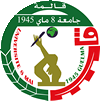Contact ................ E-mail ................ University
مجازر الثامن ماي 1945م القمع والإبادة في ميزان القانون الدولي

مجازر الثامن ماي 1945م القمع والإبادة في ميزان القانون الدولي
ديباجة الملتقى:
During the two planetary wars, the world saw mass executions and appalling war crimes that are unalterable from historical memory. These were crimes against humanity that were not paralleled during the twentieth century except by those perpetrated by colonial France in Algeria during the 1830-1962 period, when brutal repression and merciless extermination of all kinds went beyond the limits of humanity in the demonstrations of 8 May 1945. During these events, the most powerful French military force in the Atlantic Alliance carried out the bloodiest and most atrocious massacres, as well as the deliberate genocide of thousands of defenseless and innocent Algerians, in a flagrant plot to split the national movement and the Algerian struggle to free themselves from the bonds of the French rule.
The extreme repression of all types and the genocide of Algerians for months had been observed by the international community, the United Nations bodies, and the humanitarian organizations. Most of them remained silent over the condemnation of the authors of the slogan "justice, equality, freedom." International law with all its institutions also condoned its condemnation in parallel with its denunciation of Nazi crimes and massacres committed during the Second World War. At that time, historical trials of the regime's leaders and imaginary punishments for the perpetrators of such crimes were enacted, as well as the denial and condemnation by representatives of international bodies; which is the quite opposite of what happened during the 8 May 1945 massacre in Algeria. Although the carnage undoubtedly fit in the classification of humanitarian crimes, the features of this crime and one of the tragedies that history recorded were hidden and the international community remained silent on it to this day.
- إشكالية الملتقى
- أهداف الملتقى
- محاور الملتقى
- اللجنة العلمية للملتقى
- اللجنة التنظيمية للملتقى
- شروط المشاركة و ضوابطها
- مواعيد هامة
- البريد الالكتروني للملتقى
- استمارة المشاركة
- تفاصيل المشاركة في الطبعة الأولى للمسابقة الوطنية لأحسن أطروحة دكتوراه حول الجرائم والإبادة الجماعية في الذاكرة الوطنية: 1830- 1962











